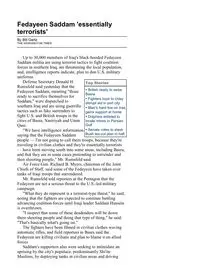
Fedayeen Tactics PDF
Preview Fedayeen Tactics
Fedayeen Saddam 'essentially terrorists' By Bill Gertz THE WASHINGTON TIMES Up to 30,000 members of Iraq's black-hooded Fedayeen Saddam militia are using terrorist tactics to fight coalition forces in southern Iraq, are threatening the local population, and, intelligence reports indicate, plan to don U.S. military uniforms. Defense Secretary Donald H. Rumsfeld said yesterday that the Fedayeen Saddam, meaning "those ready to sacrifice themselves for Saddam," were dispatched to southern Iraq and are using guerrilla tactics such as fake surrenders to fight U.S. and British troops in the cities of Basra, Nasiriyah and Umm Qasr. "We have intelligence information saying that the Fedayeen Saddam people — I'm not going to call them troops, because they're traveling in civilian clothes and they're essentially terrorists — have been moving south into some areas, including Basra, and that they are in some cases pretending to surrender and then shooting people," Mr. Rumsfeld said. Air Force Gen. Richard B. Myers, chairman of the Joint Chiefs of Staff, said some of the Fedayeen have taken over tanks of Iraqi troops that surrendered. Mr. Rumsfeld told reporters at the Pentagon that the Fedayeen are not a serious threat to the U.S.-led military campaign. "What they do represent is a terrorist-type threat," he said, noting that the fighters are expected to continue battling advancing coalition forces until Iraqi leader Saddam Hussein is overthrown. "I suspect that some of these deadenders will be down there shooting people and doing that type of thing," he said. "That's basically what's going on." The fighters have been filmed in civilian clothes waving automatic rifles, and field reporters in Basra said the Fedayeen are killing civilians and plan to blame it on allied forces. Saddam's supporters also were seeking to intimidate an uprising by the city's populace, predominantly Shi'ite Muslims, by deploying tanks in civilian areas and driving Top Stories • British ready to seize Basra • Fighters loyal to Uday disrupt aid in port city • Blair's hard line on Iraq gains support at home • Dolphins enlisted to locate mines in Persian Gulf • Senate votes to slash Bush tax-cut plan in half close to crowds roaming the streets. One report quoted a coalition officer as saying that any move into central Basra would be delayed until daylight today so as to better distinguish between pro- and anti-Saddam forces. U.S. intelligence officials said the Fedayeen have obtained the light-brown camouflage uniforms used by American troops. Even before the war began, there were reports that Saddam had ordered the purchase of U.S. uniforms, which are widely available for commercial sale around the world. One official said no Fedayeen have been found with the uniforms. U.S. officials said the fighters are likely to wear the uniforms and attempt to blend in with American troops before opening fire or conducting other guerrilla attacks. There also are fears the Fedayeen will massacre local Iraqis in areas occupied by U.S. and British troops and then blame the attacks on the United States. Jim Wilkinson, director of strategic communication at Central Command in Tampa, Fla., has said Saddam had ordered the purchase of the U.S. uniforms. "Saddam intends to issue these uniforms to Fedayeen Saddam troops who would wear them when conducting reprisals against the Iraqi people so that they could pass the atrocities off as the work of the United States and the United Kingdom," Mr. Wilkinson said March 5. An intelligence official said there may be as many as 30,000 Fedayeen in southern Iraq and that the guerrillas appear to have moved into the area by circling around rapidly advancing armored columns. A senior defense official said that estimates about the Fedayeen numbers vary from 5,000 and 10,000 to 25,000 and 30,000. The official noted that lack of agent-based intelligence on the Iraqi government accounted for the differing estimates. Mr. Rumsfeld said Saddam has committed "acts of treachery" by dressing fighters as "liberated civilians sending soldiers out waving white flags and feigning surrender, with the goal of drawing coalition forces into the ambushes." The militia also are using Red Cross vehicles to send military instructions by courier. "These are serious violations of the laws of war," he said. "The regime's actions have had little practical military effect thus far, but they do serve as a telling reminder of why it is important that this regime be removed." Mr. Rumsfeld said he did not view the Fedayeen or the Special Republican Guard in the same category as the military because "they are more fanatical." The defense official said that in addition to Fedayeen, another irregular element has been detected: armed members of the ruling Ba'ath Party that also were dispatched by Saddam to fight. "The Fedayeen are so widely dispersed and they have been somewhat effective in using terrorist tactics against us," the official said, speaking on the condition of anonymity. Gen. Myers said the military is fighting to stop the Fedayeen and other Republican Guard troops that have "come down in civilian uniforms to keep a gun in the back of other people." "And that's what you're seeing right now," he said. Gen. Myers also said Iraq's 51st regular army division, which surrendered recently, is not fighting. However, "some of their equipment may have been used by the Fedayeen, perhaps, or other folks the Fedayeen brought with them," he said. The Fedayeen also are believed to have brought Republican Guard members who had changed into civilian clothes and are fighting in the south. Gen. Myers said most of the 51st division "ran away" and some of their tanks were used by Fedayeen or Republican Guard in a battle yesterday against British troops. "They were defeated by the British," he said.
